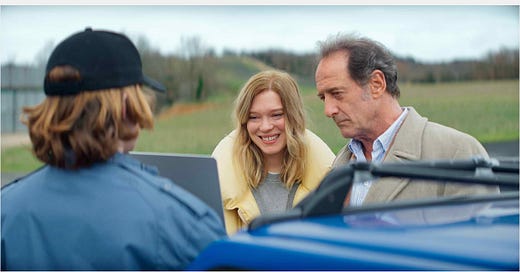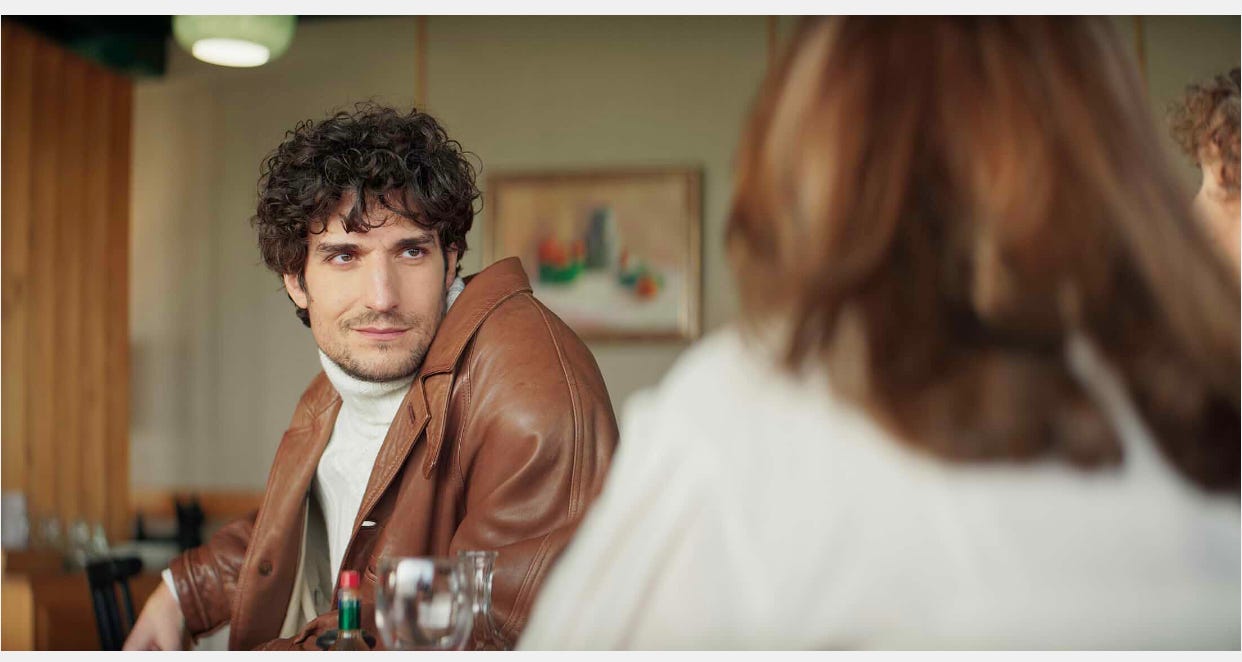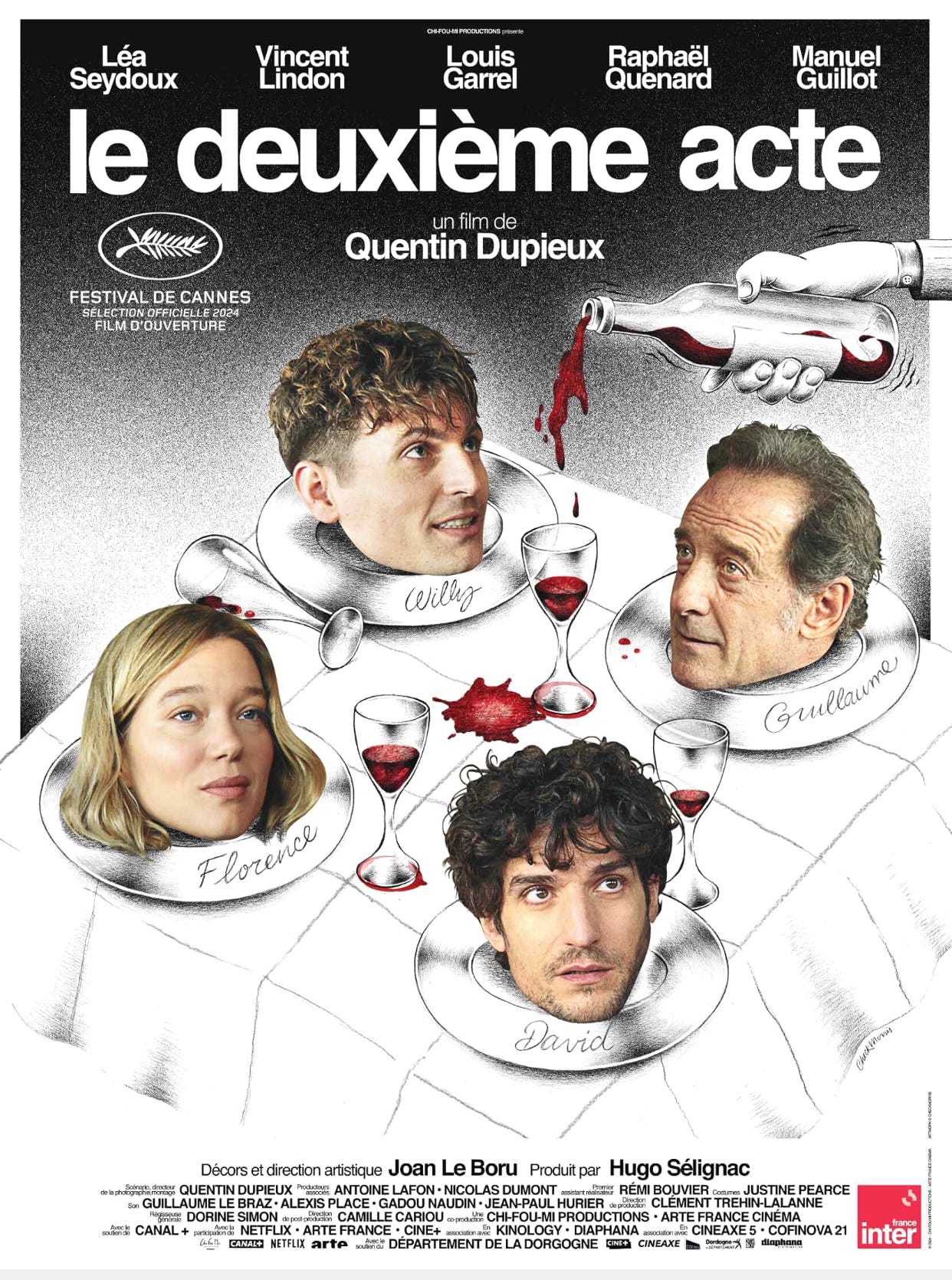I’ve got reviews of two French movies for you today: First up, it’s Le deuxième acte by Quentin Dupieux, which last year opened the Cannes Film Festival and is slowly making its way around the globe. One of the stars of the movie is the eminently watchable Léa Seydoux, who in 2023 starred in another great movie: The Beast by Bertrand Bonello. So I thought it would be fun to combine the two.
Le deuxième acte (or: The Second Act) by Quentin Dupieux is a funny and layered comedy about a group of actors filming a movie within a movie within, well, a movie.
If that sounds like a joke, it probably is, but the movie does touch on some serious issues as well.
Not only written and directed but also shot and edited by Dupieux himself, Le deuxième acte opens with a long tracking shot of two men, David (Louis Garrel) and Willy (Raphaël Quenard) walking towards a restaurant in the middle of nowhere, talking about a woman, Florence (Léa Seydoux) they are supposed to meet. Apparently, Florence thinks that she and David are in a relationship and he needs Willy to impress her so much that she will divert his attention to him.
Willy doesn’t understand why David doesn’t want to be with such a beautiful woman, and starts accusing him of perhaps being a homosexual. David gets angry, not so much about the accusation, as he is openly bisexual, but because they are being filmed and you can’t say stuff like that anymore without the risk of getting canceled.
Dupieux then switches to another long take, this time of Florence who has brought her father Guillaume (Vincent Lindon) along to her date in the diner. Pretty soon the fourth wall between actors and audience is broken again.
First, Guillaume starts to complain about the poor quality of the script and wants to leave the set, setting of a rage in Florence who accuses him of being unprofessional. But then Guillaume gets a call on his cell, that changes everything.
It’s his agent telling him that none other than Paul Thomas Anderson has a role for him in his next movie. This soon becomes a running gag, with the other three pretending not to give a shit.
When the actors finally arrive at the restaurant, the actors keep breaking the fourth wall, slipping in and out of character, which makes you wonder why there is no director telling them what to do.
It’s a question that will be answered later in the movie, but not before an awkward extra, Stephane (Manuel Guillot), makes a fool of himself as a waiter who is so nervous that he keeps spilling more wine outside the glass than in.
It’s hilarious stuff, but soon the story takes a dark turn, before the actors wrap for the day, and they suddenly become their normal selves, leaving me to feel that everything before that was part of an elaborate act. But of course we are still watching a movie within a movie within a movie, so my guess is that Dupieux is telling us that everything that happens on screen is both real and not real.
That aside, the dialogue driven but still well paced and visually arresting Le deuxième acte has a lot on its busy mind. About the use of AI in movies. Or more precisely: movies driven by AI. Dupieux seems to be warning us about them, while perhaps at the same time acknowledging that they will at some point become inevitable, as long the people who are still involved get paid enough. It’s a horrible thought, but humans, faced with the question to evolve or die, have usually chosen to evolve.
But Le deuxième acte is about other things as well. It’s about fear, failure and frustration. About actors, their vulnerabilities and their sometimes monstrous egos.
In one scene Florence calls her mom, who basically tells her she sucks at her job. Which is a bit hard to believe, as she is played by Seydoux, who is of course quite brilliant, but I have known some actors in my life and even the best ones have to fight their insecurities.
Le deuxième is about #metoo which came to France later than to most other countries. And perhaps it’s also about people who fall by the wayside while the train keeps rolling down the track.
All that aside, Le deuxième acte also works as an acting treat. Seydoux, Garrel and Lindon are actors at the top of their game, while Quenard may be younger and less experienced, but he matches the others step for step, and Guillot leaves a lasting impression in a supporting role.
The title, by the way, is a bit of an in-joke, as the movie basically begins with the second act - we never see David and Florence meet - while the movies of Quentin Dupieux are often commented on for not having proper third acts, as they usually come in under 90 minutes, with Le deuxième acte clocking in at 82 with credits.
Ever since Dupieux (who is also known as DJ/producer Mr. Oizo) made his feature film debut with Rubber (2010) - an absurdist movie about a car tire with homicidal powers, he has made movies at a breakneck speed, this one being his sixth in four years.
Le deuxième acte was the opening film of last year’s Cannes Film Festival, and while it’s absolutely a niche film for an audience of cinephiles, it’s well worth seeing for exactly that reason.
I give it four stars!
Note: Le deuxième acte has been playing the festival circuit while the movie has also been theatrically released in some countries, like France, Switzerland, Austria, Argentina, Uruguay and Spain. This week it’s released in the Netherlands, with Poland to follow later this month. In some territories it’s available to stream through Amazon Prime Video or local platforms.
The Beast (Bertrand Bonello, 2023)
Only two years after its premiere in Venice, The Beast is already viewed as a modern classic. The 10th movie by French filmmaker Bertrand Bonello (Nocturama, Saint Laurent) is a romantic sci-fi drama that spans three lifetimes.
It’s a 145 min. movie to lose yourself in, but along the way you may get lost, so some basic set-up first.
The story takes place in 2044, but goes back to 1910 and 2014. In 2044 the world has been benevolently taken over by AI, which has prevented the outbreak of nuclear war, but which has also reduced the number of jobs considerably.
Gabrielle (Léa Seydoux) wants to work, but to improve her chances, she decides to undergo memory therapy to rid her DNA of the traumas from her past lives - reincarnation is a given here - and become more neutral in her emotions.
It’s not the worst kind of dystopia to live in, but it’s not utopia either.
So Gabrielle goes back to 1910, when she lived in Paris married to a businessman, but also falling in love with dashing gentleman Louis (George MacKay).
In the second session she goes back to 2014, when she tried to make it as a French actress living in Los Angeles, also meeting Louis, only this time round he is not a man of the world, but a lonely incel with violent impulses.
And yes, they also meet in 2044, when fun is something associated with the past.
The movie is inspired by the short story The Beast in the Jungle (1903) by Henry James, about a man so afraid of something he can’t see that he starts catastrophizing.
Bonello elaborated on this: we are stuck in a present in which we are constantly reminded of our past traumas while at the same time afraid of a highly uncertain future.
The answer to the problem may be to live in the moment, but because there are so many triggers in our daily lives that’s not as easy as it may seem.
The Beast is a movie with a lot on its mind, both philosophically and spiritually, and it often moves at a slow but deliberate pace.
It’s beautifully shot and cleverly edited, the actors are excellent, and there are elements, like a knife, or characters, like a fortune teller, that appear in different timelines, to connect the different story strands together.
The movie also seems to subscribe to the theory that we are destined to meet the same people that are important to us again and again as our souls travel through the ages. (Whether or not you believe this, it’s an interesting thought.)
The Beast is probably not for everyone. It demands an intellectual investment that’s rare these days, but it pays off in spades.
It starts off as a costume drama, but evolves into something else completely in the second half, when it moves into the realm of weird Hollywoodland movies like Mulholland Drive by David Lynch and The Neon Demon by Nicholas Winding Refn, before delivering a gut punch ending.
If we are not able to feel as much as we once did, will be still be able to love with all our heart?
I give it a 4 1/2 stars!
Note: The Beast is available to stream through platforms like Amazon Prime Video, Apple TV and Google Play Movies.









